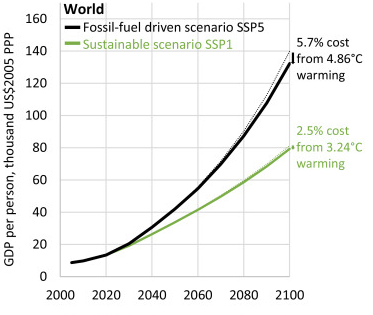This week we look at part 3 of Bjorn Lomborg’s massive 2020 study of everything known, believed, hypothesized, guessed and outright made up regarding how climate change will affect the world in the 21st century. He begins by taking a simple overview of a type of analysis called Integrated Assessment. IA models have tended over the years to show that small amounts of warming don’t cause much harm and probably make a lot of places better off, and even with a lot of warming the effects aren’t all that bad. And since the leading proponent of IA modeling, Yale’s William Nordhaus, won a Nobel Prize in economics for his work, it’s not easy for the alarmists to wave it aside. Still, they practice dismissing informed criticism a lot. Unfortunately for them, as Lomborg shows, evidence that climate change won’t do much harm to the economy, whereas trying to prevent it is by far the costlier path, comes not just from economists but from the IPCC’s own numbers.
Nor is Nordhaus alone in his views among economists. Lomborg shows that there are many IA models but the biggest and best known ones all more or less agree that climate change will only shave a small amount off prosperity by 2100, a result which won’t even be noticeable in the context of massive growth. Instead of per capita income being six times larger it might be only 5.9 times larger. And the models that say this are not weird outliers contrived by freaks and “deniers”. Instead they are the mainstream models used by, among others, the IPCC and the US Environmental Protection Agency to study the issue.
Of course these models do have their critics. Lomborg discusses complaints about IA models such as that they don’t take account of climate crises and wahhhhh wahhhhh wahhhhh like Greenland melting or the oceans turning to acid. But Lomborg points out that the models do, in fact, consider these things, weighted by reasonable probabilities. Other critics have come up with much larger damage estimates by claiming that climate change will not just demolish the economy but cut the long-term rate of growth.
There are a couple of studies making that claim. And of course the IPCC hyped them in its report. But Lomborg points out that over time as more economists have published studies and looked at the issues closely, they have concluded climate change is more likely to accelerate growth than reduce it. (Summer, we point out for illustrative purposes, is a better time for growing crops than winter.)
Then Lomborg presents a chart that reveals perfectly how upside down the climate discussion is. The Figure shows IPCC projections of income per capita under three scenarios. The thin black top line shows the growth of income if we keep using fossil fuels without making much effort to reduce emissions and warming doesn’t cost anything. This scenario is called SSP5 and it projects a lot of warming: nearly 5 degrees C. The next line down, the thick black one, shows the outcome under SSP5 after taking account of the projected costs of warming. In that version income is about 6% lower than it would have been without warming. But even so income is still about 13 times higher than today, meaning that civilization as we know it will end because we get unimaginably richer not poorer.
What if despite this scenario we decide to appease the angry climate gods and impose an aggressive climate policy agenda? Then we get the outcome called SSP1 that is shown as the green lines. Since there is less warming the costs attributable to climate change are lower, about 2.5% of the income we will be earning in 2100. But so is economic growth: income only grows about 8 times higher. So we’re better off under the high-growth scenario even with the extra warming than the scenario where we cut warming in half. And by better off we don’t mean a few bucks. The difference is five times current per capita income.

Now alarmists may at this point take the fall-back position that money can’t buy happiness. To which we cite the old saw that “Rich or poor, it’s nice to have money.” Especially since Lomborg shows that the various outcomes are mostly the same for rich and poor countries alike, including Africa.
For poor countries in particular, growth remains an urgent imperative. And the real threat to growth in the coming century is not climate change, it’s climate policy.
Next week: the costs and benefits of the Paris Treaty.


